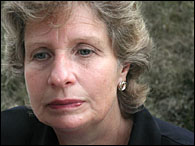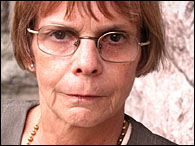Gambling with our lives
 Phyllis Vineberg, anti-VLT activist
Phyllis Vineberg, anti-VLT activistPHOTO: Claudio Calligaris |
|
Behind every video lottery terminal is a team of computer engineers, product analysts, statisticians and psychologists, all of whom worked together to create the perfect vicious machine. It creates the illusion of hope -- hope that winning is possible.
 Social Work professor Estelle Hopmeyer
Social Work professor Estelle HopmeyerPHOTO: Claudio Calligaris |
|
That illusion is designed to suck every penny possible out of anyone who may be feeding the machine in the often-desperate need for their next quarter to hit the jackpot.
The failure of that hope -- usually after the loss of tens of thousands of dollars -- has been directly linked to more than 100 reported suicides in Quebec in the last nine years. In that light, advertising campaigns by the provincial government to gamble "responsibly," or to "keep the game a game" seem not just laughable, but cruel.
Phyllis Vineberg faces that cruelty every day. Not only in her activism to make people aware of the insidious nature of VLTs, but in her personal loss —Vineberg's son Trevor committed suicide seven years ago, after having failed in his struggle to overcome his gambling addiction. By the time he took his life, he had spent $100,000 on VLTs -- and still characterized himself as a small-time gambler.
"I am compelled to speak because our son, and our family, could be any family in Quebec," said Vineberg.
That is an easy contention to deny -- no one wants to believe it could happen to them, or their loved ones. This denial – and the stigma that suicide still carries with it -- is something that Vineberg tries to fight. She freely admits that after her son killed himself, her first reaction was to protect his, and her family's, reputation. Her journey from grieving mother to political activist began with a group that was founded by McGill Social Work professor Estelle Hopmeyer.
Called Family Survivors of Suicide (FSOS), the self-help group is open-ended. Anyone who has lost a loved one to suicide can come and meet with others who are dealing with the same loss. Twice a year, FSOS hold an open meeting, where members of the public are invited to a talk.
"The primary goal is to talk about suicide [and] to make this a more open topic," said Hopmeyer of the September 19 event at which Vineberg spoke.
"The other goal, for survivors of suicide was to see Phyllis's journey and her courage -- to see that there is life after a suicide."
Hopemeyer explained that suicide is difficult to deal with for survivors, in part because it is so stigmatized -- grieving family members are often blamed for not seeing that a person was going to take their own life. In the 14 years that Hopmeyer has served as a consultant to FSOS, she estimates a staggering 2000 people have attended the twice-monthly meetings in the School of Social Work.
Quebec has the highest rate of suicide in Canada -- a number that has probably been increased by the ready availability of VLTs. Vineberg pointed out that the machines are in some 4000 sites in the provence, including bars, family restaurants, even in the back rooms of some arcades. She believes that the disingenuous nature of the machine -- the "illusion of control" that VLTs afford the user over what is actually a predetermined outcome -- means that her son was not the victim of a compulsion, or even an addiction.
"The truth is, he was an uninformed consumer," she said.
If users of VLTs were told the truth about the machines -- that the chances of getting the jackpot are not controlled by anything the user does, nor affected by the amount of times the game is played -- they could make informed choices. That they don't know that the outcome is set the instant their money is put in the machine, is the result of a moral failure of the provincial government.
"Loto-Québec and the Quebec government have put profits over the sanctity of human life," she said.
Her story touched a nerve with members of the audience, many of whom had struggled with similar problems. One man spoke of how he lost $75,000 he couldn't afford, at the Montreal Casino. His reward?
"They gave me a gold watch from Birks on Christmas, and the next year they gave me a new coat. They said I was a valued customer," he said bitterly.
The government may soon have to pay the price of that moral failure. Vineberg concluded her talk with an exhortation for the assembled -- many of whom had been affected in some way by gambling addictions -- to take action. Maître Roger Garneau, followed with an example of how action might be taken.
Garneau is a lawyer from Quebec City whose firm has launched a $579-million class-action lawsuit against the provincial government and Loto-Québec on behalf of the estimated 119,000 people who have become addicted to VLTs in this province since 1993.
Garneau spoke movingly of his lead client, Jean Brochu, a lawyer with a successful practice and father of two children. Brochu became so hooked on VLTs -- losing $500 a day -- that he would forget to meet with clients, or even eat. Eventually, his compulsion was so great he defrauded his legal association of $50,000.
"He was on the edge of suicide, he had lost his job, he was disbarred and charged with fraud," said Garneau.
Brochu came to Garneau's firm for help. They helped him avoid prosecution and regain his licence to practice law but Brochu wanted to do more.
"He said, 'I would like to help these people, who were like me but have no help,'" related Garneau.
They hope the class-action lawsuit will force the Quebec government to compensate victims for damages, and create a fund for counselling. Garneau said that he expects that the suit will likely be resolved within the year.
Family Survivors of Suicide meets at the School of Social Work, 3506 University, rm. 227, 5:30 pm to 7:30 pm on the second and fourth Thursday of every month from Sept to June. For information on this or other bereavement groups offered at the McGill Centre for Loss and Bereavement please call Estelle Hopmeyer at 398-7067.

